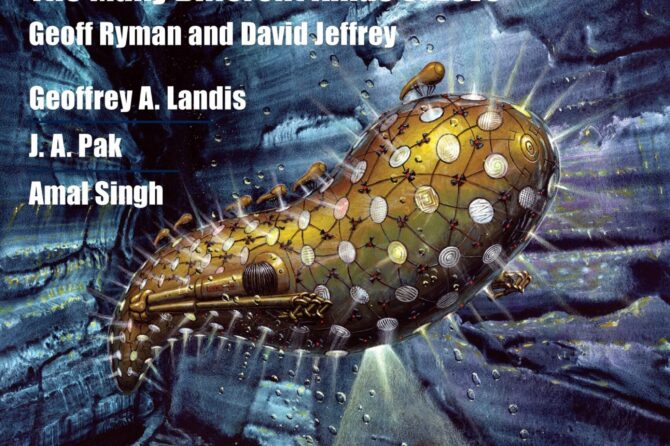So… what if you were to drag Sam Spade out of the 1930s, dust off his fedora and teach him about social media in the present, then drop him off on Mars to start a detective agency?
That’s one way to look at the setting of Chris Lewis’s SF detective novel, Trouble Wore Red. It’s not a good way to look at it… but it’s a start.
A better way to look at the setting is “alt-present SF.” Where you’re essentially taking the modern day and dropping it fifty or a hundred years from now. Now, granted, many would argue that ALL science fiction is really about the present, but this is more obviously so, and that is to its credit.
So yeah, you’ve got space stations and fancy tech-tech, but how you see that tech applied feels very grounded in the modern day, right along with the generation gap that exists in its users.
Robert “Rocky” Mountain is a PI normally based out of Mars, but has come back to his old haunt on Commerce Station for a quick and easy job, the kind he loves, taking down a crooked politician. But before he can leave, his ex shows up, offering him a job. He really should turn her down, but he can’t.
For this job he’s going to need his entire team, though, so he brings in his security expert, Kershaw, and his personal assistant Kim, who doesn’t suffer fools lightly but somehow still puts up with Rocky.
It seems to be a straightforward job. Someone broke into Penny’s apartment, and she wants Rocky to find out who, and why.
But as much as he tries to keep his focus on the present, the evidence keeps him looking to the past. Hers, his, and those of their friends. And as much as he wants to keep things professional, the personal aspects keep getting in the way.
Trouble Wore Red is your classic hard-boiled detective story reimagined for the modern age and with a few different things to say. I wouldn’t call it Noir, though it does flirt with the notion.
You see, Noir as a genre tends to be set in a world of systemic corruption and the disillusionment of the everyman in the face of that corruption. The protagonists are often self-destructive, and the situations they find themselves in results in a lose-lose scenario. The characters are often in a downward spiral that they can’t get out of.
A hard-boiled detective story, on the other hand, may have the same kind of backdrop, and the characters also tend to be disillusioned or pessimistic, but there still is a push towards doing the right thing, even if things don’t end well for everyone.
The difference, you might say, depends on whether the demons on the protagonist’s shoulder wins out or not.
Rocky is most definitely disillusioned and pessimistic, but at the same time he recognizes that it’s a hell of his own making. He’d made peace with it back on Mars, but coming to Commerce Station dredges up the past for him in the worst possible ways.
At its core, this conflict is internal. In dealing with the present mystery, he has to come to terms with the fact that the past is long gone. And that’s one of the core themes of the book, getting older.
As a kid, I always liked the “aging protag” trope from a distant kind of way. I mean, I was young, they were old, I couldn’t exactly SEE myself being like that someday, but it was still entertaining. I might even pretend to have old people problems in a roleplaying game in order to have a more interesting character…
Source: Noah Chinn Reviews: Trouble Wore Red by Chris Lewis











Recent Comments